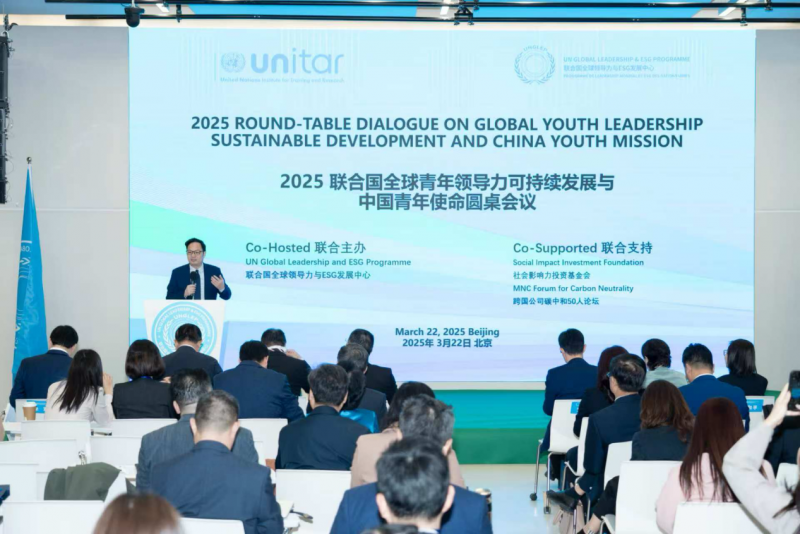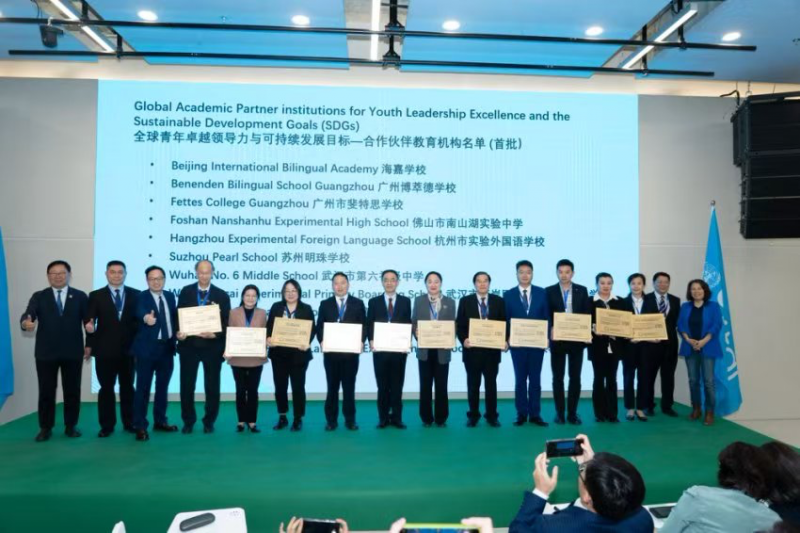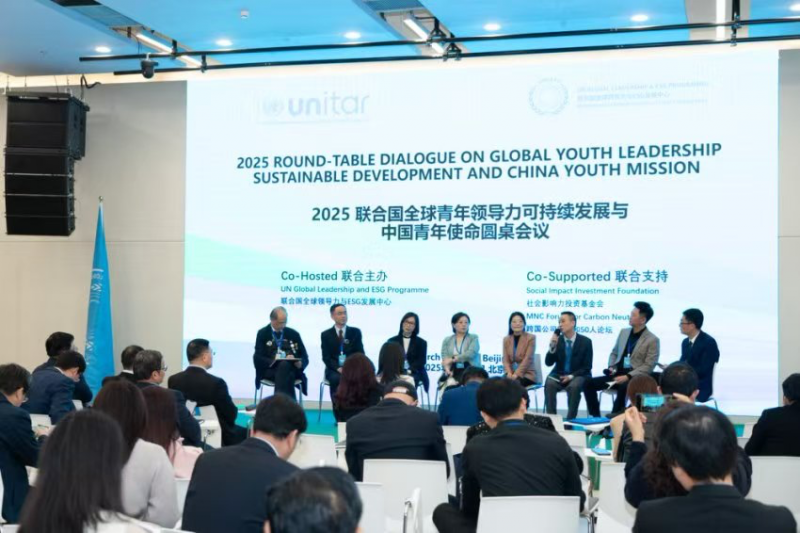2025 UN Global Youth Leadership and China
Youth Mission Conference Successfully Held in Beijing
*Source: China Daily Online | 2025-04-01
16:20*
Recently, the "2025 UN Global Youth
Leadership for Sustainable Development and China Youth Mission Roundtable
Conference," hosted by the United Nations Global Leadership and ESG
Development Programme (UNGLEP), was grandly inaugurated in Beijing. Centered on
the theme of "Global Youth Leadership and Sustainable Development,"
the conference brought together over 200 participants from UN agencies,
international organizations, multinational corporations, and youth leaders from
schools and universities across China. The event aimed to clarify the role of
youth in global governance, empower young people with leadership for
sustainable development, and accelerate the implementation of the UN 2030
Sustainable Development Goals (SDGs).

Amid escalating global challenges such as
climate change, wealth inequality, and educational disparities, youth are
increasingly recognized as a core force for change, entrusted with
unprecedented responsibility and opportunity. As future leaders in the wave of
globalization, young people are emerging as a vital force driving global
sustainable development. The UN 2030 Agenda for Sustainable Development
explicitly identifies youth as central to achieving the SDGs. This conference
focused on cultivating youth leadership, integrating international resources,
and innovating educational models to inject youthful wisdom into global
sustainability efforts through cross-sector dialogue.
Empowering Youth Leadership from Multiple
Perspectives
The conference commenced at 8:30 AM, with
Dr. Luo Xiang, Chairman of the UNGLEP, serving as the conference chair. He
highlighted that while the implementation of global SDGs faces numerous
challenges, China has achieved remarkable progress in all 17 goals, including
poverty alleviation, climate action, biodiversity, gender equality, health and
well-being, industrial innovation, and responsible consumption and production.
Dr. Luo emphasized the strategic importance of efficiently integrating
resources from the UN, educational institutions, and industry partners to
empower global youth, including Chinese youth, to become active participants,
contributors, and leaders in global governance.
Dr. Jan Mattsson, former UN
Under-Secretary-General and Executive Director of the UN Office for Project Services,
delivered a keynote speech titled "Youth Engagement in Global Governance:
From Vision to Action." He stressed that global governance faces
challenges such as climate change, inequality, and educational inequity, which
require youth participation and innovative thinking. "Youth are not just
'future leaders' but 'present actors,'" he noted, urging nations to
establish institutional platforms to support youth in decision-making.
Dr. Tang Min, former Counselor of the State
Council and Chief Economist for China at the Asian Development Bank, explored
"Innovative AI Education Models to Cultivate Future Global Youth
Leaders." He discussed how AI is reshaping education, enabling youth to
excel in global competition and become drivers of social progress. "Future
education should focus on interdisciplinary skills and critical thinking rather
than rote knowledge transfer," he asserted.
Zhao Bingdi, President of Panasonic China,
shared insights on "Multinational Corporations’ Urgent Need for Resilient
Talent to Advance UN SDGs." He emphasized that multinational companies are
not only economic drivers but also key players in sustainability. Zhao
highlighted the demand for resilient, innovative, and globally minded youth to
integrate ESG strategies into business operations, calling for stronger
collaboration between corporations and educational institutions.
Zhu Shouqing, former Climate Action Lead
for Greater China at the World Economic Forum and UNEP Policy Advisor,
discussed "How Chinese Youth Can Lead Global Low-Carbon Transition."
He urged youth to pioneer green lifestyles and climate diplomacy, advocating
for institutional support to nurture their environmental leadership.

Launch of the Global Youth ESG Leadership
Empowerment Initiative
Wang Chunxing, Senior Program Officer of
UNGLEP, unveiled the "2025 Global Project Plan," which fosters youth
leadership in sustainability through UN-education-industry partnerships. The
launch included the "Global Youth Leadership and SDG Education Partnership
Accreditation" and "Senior Mentor Appointment Ceremony," marking
the plan’s operational phase. The initiative will partner with schools to
provide international exchanges, innovation labs, and mentorship.

Roundtable: Innovating Youth Talent
Development
A panel on "Innovative Youth Talent
Cultivation: Leveraging International Resources to Shape Future Global
Leaders" featured experts like Zhang Liang (Vice President of Guanghua
Education Group), Chen Tielin (Principal of Hangzhou Experimental Foreign
Language School), and Liu Diwen (International Cooperation Director of Beijing
North Investment Group). Key takeaways included:
Zhang Liang: "International curricula
must integrate local realities to avoid impractical 'ivory tower'
education."
Chen Tielin: "Leadership training
should start early, emphasizing social responsibility."
Liu Diwen: "Tripartite platforms
linking governments, businesses, and international organizations are essential
for youth engagement in global governance."
The panel agreed on the need for youth
talent databases, policy support, and deeper cross-sector collaboration.
Closing and Future Initiatives
The conference concluded at 12:30 PM with a
keynote by Cheng Jiashu, Executive Director of Stanford Center at Peking University,
on "What Do World-Class Universities Seek in Youth Talent?" He
highlighted the importance of global vision, innovation, and social
responsibility, urging youth to contribute to sustainable development.
Key outcomes included:
Establishment of the "Global Youth
Leadership and SDG Education Council"
Launch of the "Summer Innovation Week
on Youth Leadership and SDGs"
"AI for SDG Innovation Challenge"
and "Multinational SDG Internship Program"
"25 Under 25 Global Outstanding Youth
Awards"
Dr. Luo Xiang closed with a powerful
statement: "Youth are the 'present tense'—not the 'future'—of sustainable
development. True leadership stems from deep understanding and courageous
action."
The event was supported by the United
Nations Institute for Training and Research, the Carbon Neutrality 50 Forum,
and the Global Ecological Sustainable Development Union.
"Only by empowering and listening to
youth can we unite global forces to fulfill the 2030 Agenda."


